Order-infinite-3 triangular honeycomb
| Order-infinite-3 triangular honeycomb | |
|---|---|
| Type | Regular honeycomb |
| Schläfli symbols | {3,∞,3} |
| Coxeter diagrams | |
| Cells | {3,∞} |
| Faces | {3} |
| Edge figure | {3} |
| Vertex figure | {∞,3} 
|
| Dual | Self-dual |
| Coxeter group | [3,∞,3] |
| Properties | Regular |
In the geometry of hyperbolic 3-space, the order-infinite-3 triangular honeycomb (or 3,∞,3 honeycomb) is a regular space-filling tessellation (or honeycomb) with Schläfli symbol {3,∞,3}.
Geometry
It has three Infinite-order triangular tiling {3,∞} around each edge. All vertices are ultra-ideal (existing beyond the ideal boundary) with infinitely many triangular tilings existing around each vertex in an order-3 apeirogonal tiling vertex figure.
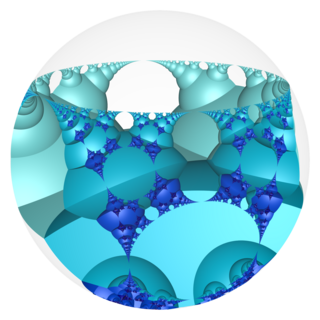 Poincaré disk model |
 Ideal surface |
Related polytopes and honeycombs
It is a part of a sequence of regular honeycombs with Infinite-order triangular tiling cells: {3,∞,p}.
It is a part of a sequence of regular honeycombs with order-3 apeirogonal tiling vertex figures: {p,∞,3}.
It is a part of a sequence of self-dual regular honeycombs: {p,∞,p}.
Order-infinite-4 triangular honeycomb
| Order-infinite-4 triangular honeycomb | |
|---|---|
| Type | Regular honeycomb |
| Schläfli symbols | {3,∞,4} {3,∞1,1} |
| Coxeter diagrams | |
| Cells | {3,∞} |
| Faces | {3} |
| Edge figure | {4} |
| Vertex figure | {∞,4}  r{∞,∞} 
|
| Dual | {4,∞,3} |
| Coxeter group | [3,∞,4] [3,∞1,1] |
| Properties | Regular |
In the geometry of hyperbolic 3-space, the order-infinite-4 triangular honeycomb (or 3,∞,4 honeycomb) is a regular space-filling tessellation (or honeycomb) with Schläfli symbol {3,∞,4}.
It has four infinite-order triangular tilings, {3,∞}, around each edge. All vertices are ultra-ideal (existing beyond the ideal boundary) with infinitely many infinite-order triangular tilings existing around each vertex in an order-4 apeirogonal tiling vertex figure.
 Poincaré disk model |
 Ideal surface |
It has a second construction as a uniform honeycomb, Schläfli symbol {3,∞1,1}, Coxeter diagram, ![]()
![]()
![]()
![]()
![]() , with alternating types or colors of infinite-order triangular tiling cells. In Coxeter notation the half symmetry is [3,∞,4,1+] = [3,∞1,1].
, with alternating types or colors of infinite-order triangular tiling cells. In Coxeter notation the half symmetry is [3,∞,4,1+] = [3,∞1,1].
Order-infinite-5 triangular honeycomb
| Order-infinite-5 triangular honeycomb | |
|---|---|
| Type | Regular honeycomb |
| Schläfli symbols | {3,∞,5} |
| Coxeter diagrams | |
| Cells | {3,∞} |
| Faces | {3} |
| Edge figure | {5} |
| Vertex figure | {∞,5} |
| Dual | {5,∞,3} |
| Coxeter group | [3,∞,5] |
| Properties | Regular |
In the geometry of hyperbolic 3-space, the order-infinite-3 triangular honeycomb (or 3,∞,5 honeycomb) is a regular space-filling tessellation (or honeycomb) with Schläfli symbol {3,∞,5}. It has five infinite-order triangular tiling, {3,∞}, around each edge. All vertices are ultra-ideal (existing beyond the ideal boundary) with infinitely many infinite-order triangular tilings existing around each vertex in an order-5 apeirogonal tiling vertex figure.
 Poincaré disk model |
 Ideal surface |
Order-infinite-6 triangular honeycomb
| Order-infinite-6 triangular honeycomb | |
|---|---|
| Type | Regular honeycomb |
| Schläfli symbols | {3,∞,6} {3,(∞,3,∞)} |
| Coxeter diagrams | |
| Cells | {3,∞} |
| Faces | {3} |
| Edge figure | {6} |
| Vertex figure | {∞,6} {(∞,3,∞)} |
| Dual | {6,∞,3} |
| Coxeter group | [3,∞,6] |
| Properties | Regular |
In the geometry of hyperbolic 3-space, the order-infinite-6 triangular honeycomb (or 3,∞,6 honeycomb) is a regular space-filling tessellation (or honeycomb) with Schläfli symbol {3,∞,6}. It has infinitely many infinite-order triangular tiling, {3,∞}, around each edge. All vertices are ultra-ideal (existing beyond the ideal boundary) with infinitely many infinite-order triangular tilings existing around each vertex in an order-6 apeirogonal tiling, {∞,6}, vertex figure.
 Poincaré disk model |
 Ideal surface |
Order-infinite-7 triangular honeycomb
| Order-infinite-7 triangular honeycomb | |
|---|---|
| Type | Regular honeycomb |
| Schläfli symbols | {3,∞,7} |
| Coxeter diagrams | |
| Cells | {3,∞} |
| Faces | {3} |
| Edge figure | {7} |
| Vertex figure | {∞,7} |
| Dual | {7,∞,3} |
| Coxeter group | [3,∞,7] |
| Properties | Regular |
In the geometry of hyperbolic 3-space, the order-infinite-7 triangular honeycomb (or 3,∞,6 honeycomb) is a regular space-filling tessellation (or honeycomb) with Schläfli symbol {3,∞,7}. It has infinitely many infinite-order triangular tiling, {3,∞}, around each edge. All vertices are ultra-ideal (existing beyond the ideal boundary) with infinitely many infinite-order triangular tilings existing around each vertex in an order-7 apeirogonal tiling, {∞,7}, vertex figure.
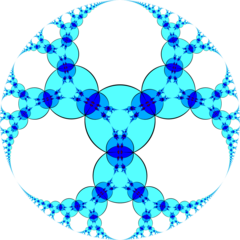 Ideal surface |
Order-infinite-infinite triangular honeycomb
| Order-infinite-infinite triangular honeycomb | |
|---|---|
| Type | Regular honeycomb |
| Schläfli symbols | {3,∞,∞} {3,(∞,∞,∞)} |
| Coxeter diagrams | |
| Cells | {3,∞} |
| Faces | {3} |
| Edge figure | {∞} |
| Vertex figure | {∞,∞} {(∞,∞,∞)} |
| Dual | {∞,∞,3} |
| Coxeter group | [∞,∞,3] [3,((∞,∞,∞))] |
| Properties | Regular |
In the geometry of hyperbolic 3-space, the order-infinite-infinite triangular honeycomb (or 3,∞,∞ honeycomb) is a regular space-filling tessellation (or honeycomb) with Schläfli symbol {3,∞,∞}. It has infinitely many infinite-order triangular tiling, {3,∞}, around each edge. All vertices are ultra-ideal (existing beyond the ideal boundary) with infinitely many infinite-order triangular tilings existing around each vertex in an infinite-order apeirogonal tiling, {∞,∞}, vertex figure.
 Poincaré disk model |
 Ideal surface |
It has a second construction as a uniform honeycomb, Schläfli symbol {3,(∞,∞,∞)}, Coxeter diagram, ![]()
![]()
![]()
![]()
![]()
![]()
![]() =
= ![]()
![]()
![]()
![]()
![]()
![]() , with alternating types or colors of infinite-order triangular tiling cells. In Coxeter notation the half symmetry is [3,∞,∞,1+] = [3,((∞,∞,∞))].
, with alternating types or colors of infinite-order triangular tiling cells. In Coxeter notation the half symmetry is [3,∞,∞,1+] = [3,((∞,∞,∞))].
Order-infinite-3 square honeycomb
| Order-infinite-3 square honeycomb | |
|---|---|
| Type | Regular honeycomb |
| Schläfli symbol | {4,∞,3} |
| Coxeter diagram | |
| Cells | {4,∞} 
|
| Faces | {4} |
| Vertex figure | {∞,3} |
| Dual | {3,∞,4} |
| Coxeter group | [4,∞,3] |
| Properties | Regular |
In the geometry of hyperbolic 3-space, the order-infinite-3 square honeycomb (or 4,∞,3 honeycomb) a regular space-filling tessellation (or honeycomb). Each infinite cell consists of a heptagonal tiling whose vertices lie on a 2-hypercycle, each of which has a limiting circle on the ideal sphere.
The Schläfli symbol of the order-infinite-3 square honeycomb is {4,∞,3}, with three infinite-order square tilings meeting at each edge. The vertex figure of this honeycomb is an order-3 apeirogonal tiling, {∞,3}.
 Poincaré disk model |
 Ideal surface |
Order-infinite-3 pentagonal honeycomb
| Order-infinite-3 pentagonal honeycomb | |
|---|---|
| Type | Regular honeycomb |
| Schläfli symbol | {5,∞,3} |
| Coxeter diagram | |
| Cells | {5,∞} 
|
| Faces | {5} |
| Vertex figure | {∞,3} |
| Dual | {3,∞,5} |
| Coxeter group | [5,∞,3] |
| Properties | Regular |
In the geometry of hyperbolic 3-space, the order-infinite-3 pentagonal honeycomb (or 5,∞,3 honeycomb) a regular space-filling tessellation (or honeycomb). Each infinite cell consists of an infinite-order pentagonal tiling whose vertices lie on a 2-hypercycle, each of which has a limiting circle on the ideal sphere.
The Schläfli symbol of the order-6-3 pentagonal honeycomb is {5,∞,3}, with three infinite-order pentagonal tilings meeting at each edge. The vertex figure of this honeycomb is a heptagonal tiling, {∞,3}.
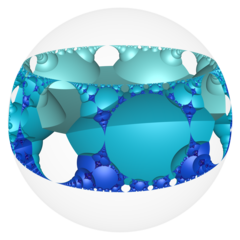 Poincaré disk model |
 Ideal surface |
Order-infinite-3 hexagonal honeycomb
| Order-infinite-3 hexagonal honeycomb | |
|---|---|
| Type | Regular honeycomb |
| Schläfli symbol | {6,∞,3} |
| Coxeter diagram | |
| Cells | {6,∞} 
|
| Faces | {6} |
| Vertex figure | {∞,3} |
| Dual | {3,∞,6} |
| Coxeter group | [6,∞,3] |
| Properties | Regular |
In the geometry of hyperbolic 3-space, the order-infinite-3 hexagonal honeycomb (or 6,∞,3 honeycomb) a regular space-filling tessellation (or honeycomb). Each infinite cell consists of an order-3 apeirogonal tiling whose vertices lie on a 2-hypercycle, each of which has a limiting circle on the ideal sphere.
The Schläfli symbol of the order-infinite-3 hexagonal honeycomb is {6,∞,3}, with three infinite-order hexagonal tilings meeting at each edge. The vertex figure of this honeycomb is an order-3 apeirogonal tiling, {∞,3}.
 Poincaré disk model |
 Ideal surface |
Order-infinite-3 heptagonal honeycomb
| Order-infinite-3 heptagonal honeycomb | |
|---|---|
| Type | Regular honeycomb |
| Schläfli symbol | {7,∞,3} |
| Coxeter diagram | |
| Cells | {7,∞} 
|
| Faces | {7} |
| Vertex figure | {∞,3} |
| Dual | {3,∞,7} |
| Coxeter group | [7,∞,3] |
| Properties | Regular |
In the geometry of hyperbolic 3-space, the order-infinite-3 heptagonal honeycomb (or 7,∞,3 honeycomb) a regular space-filling tessellation (or honeycomb). Each infinite cell consists of an infinite-order heptagonal tiling whose vertices lie on a 2-hypercycle, each of which has a limiting circle on the ideal sphere.
The Schläfli symbol of the order-infinite-3 heptagonal honeycomb is {7,∞,3}, with three infinite-order heptagonal tilings meeting at each edge. The vertex figure of this honeycomb is an order-3 apeirogonal tiling, {∞,3}.
 Ideal surface |
Order-infinite-3 apeirogonal honeycomb
| Order-infinite-3 apeirogonal honeycomb | |
|---|---|
| Type | Regular honeycomb |
| Schläfli symbol | {∞,∞,3} |
| Coxeter diagram | |
| Cells | {∞,∞} 
|
| Faces | Apeirogon {∞} |
| Vertex figure | {∞,3} |
| Dual | {3,∞,∞} |
| Coxeter group | [∞,∞,3] |
| Properties | Regular |
In the geometry of hyperbolic 3-space, the order-infinite-3 apeirogonal honeycomb (or ∞,∞,3 honeycomb) a regular space-filling tessellation (or honeycomb). Each infinite cell consists of an infinite-order apeirogonal tiling whose vertices lie on a 2-hypercycle, each of which has a limiting circle on the ideal sphere.
The Schläfli symbol of the apeirogonal tiling honeycomb is {∞,∞,3}, with three infinite-order apeirogonal tilings meeting at each edge. The vertex figure of this honeycomb is an infinite-order apeirogonal tiling, {∞,3}.
The "ideal surface" projection below is a plane-at-infinity, in the Poincaré half-space model of H3. It shows an Apollonian gasket pattern of circles inside a largest circle.
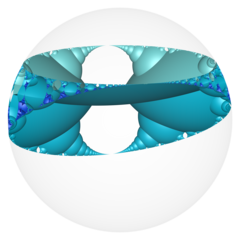 Poincaré disk model |
 Ideal surface |
Order-infinite-4 square honeycomb
| Order-infinite-4 square honeycomb | |
|---|---|
| Type | Regular honeycomb |
| Schläfli symbol | {4,∞,4} |
| Coxeter diagrams | |
| Cells | {4,∞} 
|
| Faces | {4} |
| Edge figure | {4} |
| Vertex figure | {∞,4} {∞,∞} |
| Dual | self-dual |
| Coxeter group | [4,∞,4] |
| Properties | Regular |
In the geometry of hyperbolic 3-space, the order-infinite-4 square honeycomb (or 4,∞,4 honeycomb) a regular space-filling tessellation (or honeycomb) with Schläfli symbol {4,∞,4}.
All vertices are ultra-ideal (existing beyond the ideal boundary) with four infinite-order square tilings existing around each edge and with an order-4 apeirogonal tiling vertex figure.
 Poincaré disk model |
 Ideal surface |
It has a second construction as a uniform honeycomb, Schläfli symbol {4,∞1,1}, Coxeter diagram, ![]()
![]()
![]()
![]()
![]() , with alternating types or colors of cells. In Coxeter notation the half symmetry is [4,∞,4,1+] = [4,∞1,1].
, with alternating types or colors of cells. In Coxeter notation the half symmetry is [4,∞,4,1+] = [4,∞1,1].
Order-infinite-5 pentagonal honeycomb
| Order-infinite-5 pentagonal honeycomb | |
|---|---|
| Type | Regular honeycomb |
| Schläfli symbol | {5,∞,5} |
| Coxeter diagrams | |
| Cells | {5,∞} 
|
| Faces | {5} |
| Edge figure | {5} |
| Vertex figure | {∞,5} |
| Dual | self-dual |
| Coxeter group | [5,∞,5] |
| Properties | Regular |
In the geometry of hyperbolic 3-space, the order-infinite-5 pentagonal honeycomb (or 5,∞,5 honeycomb) a regular space-filling tessellation (or honeycomb) with Schläfli symbol {5,∞,5}.
All vertices are ultra-ideal (existing beyond the ideal boundary) with five infinite-order pentagonal tilings existing around each edge and with an order-5 apeirogonal tiling vertex figure.
 Poincaré disk model |
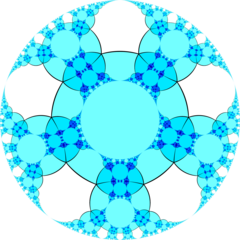 Ideal surface |
Order-infinite-6 hexagonal honeycomb
| Order-infinite-6 hexagonal honeycomb | |
|---|---|
| Type | Regular honeycomb |
| Schläfli symbols | {6,∞,6} {6,(∞,3,∞)} |
| Coxeter diagrams | |
| Cells | {6,∞} 
|
| Faces | {6} |
| Edge figure | {6} |
| Vertex figure | {∞,6} {(5,3,5)} |
| Dual | self-dual |
| Coxeter group | [6,∞,6] [6,((∞,3,∞))] |
| Properties | Regular |
In the geometry of hyperbolic 3-space, the order-infinite-6 hexagonal honeycomb (or 6,∞,6 honeycomb) is a regular space-filling tessellation (or honeycomb) with Schläfli symbol {6,∞,6}. It has six infinite-order hexagonal tilings, {6,∞}, around each edge. All vertices are ultra-ideal (existing beyond the ideal boundary) with infinitely many hexagonal tilings existing around each vertex in an order-6 apeirogonal tiling vertex figure.
 Poincaré disk model |
 Ideal surface |
It has a second construction as a uniform honeycomb, Schläfli symbol {6,(∞,3,∞)}, Coxeter diagram, ![]()
![]()
![]()
![]()
![]() , with alternating types or colors of cells. In Coxeter notation the half symmetry is [6,∞,6,1+] = [6,((∞,3,∞))].
, with alternating types or colors of cells. In Coxeter notation the half symmetry is [6,∞,6,1+] = [6,((∞,3,∞))].
Order-infinite-7 heptagonal honeycomb
| Order-infinite-7 heptagonal honeycomb | |
|---|---|
| Type | Regular honeycomb |
| Schläfli symbols | {7,∞,7} |
| Coxeter diagrams | |
| Cells | {7,∞} 
|
| Faces | {7} |
| Edge figure | {7} |
| Vertex figure | {∞,7} |
| Dual | self-dual |
| Coxeter group | [7,∞,7] |
| Properties | Regular |
In the geometry of hyperbolic 3-space, the order-infinite-7 heptagonal honeycomb (or 7,∞,7 honeycomb) is a regular space-filling tessellation (or honeycomb) with Schläfli symbol {7,∞,7}. It has seven infinite-order heptagonal tilings, {7,∞}, around each edge. All vertices are ultra-ideal (existing beyond the ideal boundary) with infinitely many heptagonal tilings existing around each vertex in an order-7 apeirogonal tiling vertex figure.
 Ideal surface |
Order-infinite-infinite apeirogonal honeycomb
| Order-infinite-infinite apeirogonal honeycomb | |
|---|---|
| Type | Regular honeycomb |
| Schläfli symbols | {∞,∞,∞} {∞,(∞,∞,∞)} |
| Coxeter diagrams | |
| Cells | {∞,∞} 
|
| Faces | {∞} |
| Edge figure | {∞} |
| Vertex figure | |
| Dual | self-dual |
| Coxeter group | [∞,∞,∞] [∞,((∞,∞,∞))] |
| Properties | Regular |
In the geometry of hyperbolic 3-space, the order-infinite-infinite apeirogonal honeycomb (or ∞,∞,∞ honeycomb) is a regular space-filling tessellation (or honeycomb) with Schläfli symbol {∞,∞,∞}. It has infinitely many infinite-order apeirogonal tiling {∞,∞} around each edge. All vertices are ultra-ideal (existing beyond the ideal boundary) with infinitely many infinite-order apeirogonal tilings existing around each vertex in an infinite-order apeirogonal tiling vertex figure.
 Poincaré disk model |
 Ideal surface |
It has a second construction as a uniform honeycomb, Schläfli symbol {∞,(∞,∞,∞)}, Coxeter diagram, ![]()
![]()
![]()
![]()
![]()
![]() , with alternating types or colors of cells.
, with alternating types or colors of cells.
See also
References
- Coxeter, Regular Polytopes, 3rd. ed., Dover Publications, 1973. ISBN 0-486-61480-8. (Tables I and II: Regular polytopes and honeycombs, pp. 294–296)
- The Beauty of Geometry: Twelve Essays (1999), Dover Publications, LCCN 99-35678, ISBN 0-486-40919-8 (Chapter 10, Regular Honeycombs in Hyperbolic Space) Table III
- Jeffrey R. Weeks The Shape of Space, 2nd edition ISBN 0-8247-0709-5 (Chapters 16–17: Geometries on Three-manifolds I, II)
- George Maxwell, Sphere Packings and Hyperbolic Reflection Groups, JOURNAL OF ALGEBRA 79,78-97 (1982) [1]
- Hao Chen, Jean-Philippe Labbé, Lorentzian Coxeter groups and Boyd-Maxwell ball packings, (2013)[2]
- Visualizing Hyperbolic Honeycombs arXiv:1511.02851 Roice Nelson, Henry Segerman (2015)
External links
- Hyperbolic Catacombs Carousel: {3,∞,3} honeycomb YouTube, Roice Nelson
- John Baez, Visual insights: {7,3,3} Honeycomb (2014/08/01) {7,3,3} Honeycomb Meets Plane at Infinity (2014/08/14)
- Danny Calegari, Kleinian, a tool for visualizing Kleinian groups, Geometry and the Imagination 4 March 2014. [3]
